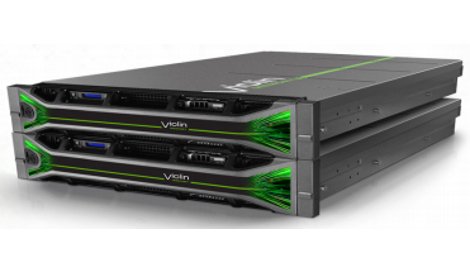Violin Memory announced Thursday that its COO Dixon Doll had left the company. The announcement came less than one month after the flash storage company's board fired CEO Donald Basile.
Santa Clara, California-based Violin sells high capacity storage arrays that use flash memory as a storage medium instead of traditional spinning disk media. In September 2013, the company went through a less-than-outstanding initial public offering, its stock value sinking on the day of the IPO, and has not been able to bring stock back to the US$9-per-share opening price.
Violin did not explain Roll's departure, saying only that the COO was moving on to “pursue other personal and professional opportunities.” Roll is also leaving the company's board of directors.
Doll said in a statement he had a “great deal of admiration and respect” for the company's team and expressed confidence in its future success. “While this was a difficult decision, in light of recent changes at the company, I believe that now is an appropriate time to let new leadership chart our future course,” he said.
The company's CTO Jonathan Goldrick has also left recently, Business Insider reported.
Violin reported about $28.3m in revenue for the third quarter of 2013 – up from $20.6m it reported for the third quarter of the preceding year. Its losses for the quartet, however, exceeded revenue.
The company's net loss was $34.1m in Q3 – up from $25.4 in Q3 2012.
Numerous lawsuits have been filed against Violin on behalf of shareholders, according to Bloomberg Technology. The plaintiffs have accused the company and its underwriters of violating securities law.
In a business update issued in December, Violin said it would “vigorously defend itself against these claims.”
Duties of the former CEO Basile have been taken over by Howard Bain, the company's chairman, temporarily, until a permanent replacement is found.
In its December business update, Violin said it was on track to launch a number of major product offerings in early 2014 that would strengthen its software stack.
In September 2013, the company had a major product release, launching a new software suite and a new appliance. The products were targeted at data center operators who were not confident about investing in large all-flash storage arrays but who were curious enough to try out a smaller flash-based solution.
Maestro Memory Services Software Suite and the Memory Services appliance integrate automatically with any legacy storage fabric, the company said. The solution analyzes traffic on the storage network and stores most frequently accessed data on flash media to demonstrate to the customer the performance gains they can get by replacing disk with flash.
Violin's stock traded at $3.92 per share at market's close Thursday.

